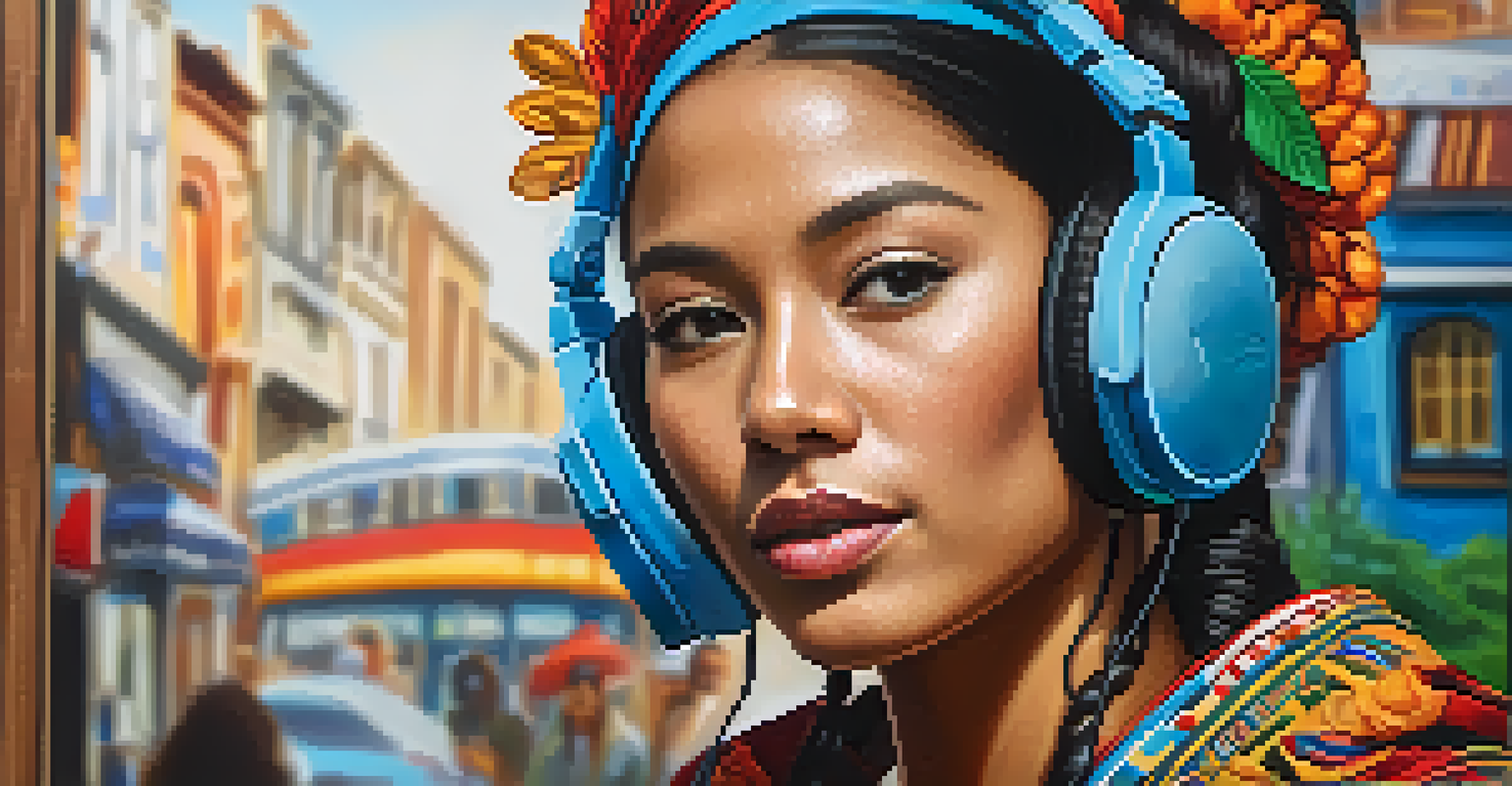The Influence of Music on Identity in Multicultural Societies

Understanding Identity in a Multicultural Context
In a multicultural society, identity is often a tapestry woven from various cultural threads. Each thread represents different backgrounds, languages, and traditions, creating a rich blend of influences. Music plays a crucial role in this process, acting as both a reflection and a shaper of individual and collective identities. As people from diverse backgrounds come together, their musical expressions provide insight into their unique experiences and values.
Music is the universal language of mankind.
For instance, consider a neighborhood where Hispanic, African, and Asian communities coexist. The music from each group not only serves as a form of entertainment but also as a medium for storytelling and cultural exchange. This blending of musical styles can lead to the creation of new genres, which further enrich the community’s identity. Thus, music becomes a powerful tool for understanding and navigating the complexities of multicultural identities.
Moreover, this shared musical landscape fosters connections among different groups. When someone hears a familiar beat or melody, it can evoke memories and emotions, bridging gaps between diverse cultures. Ultimately, the interplay of music and identity in multicultural societies illustrates how sound can transcend boundaries, fostering unity while celebrating diversity.
The Role of Music in Cultural Expression
Music serves as a vital form of cultural expression, encapsulating the values, beliefs, and histories of various groups. It allows individuals to convey their emotions and experiences in a way that words alone often cannot. In multicultural societies, this expression becomes even more significant, as it can highlight both individual and collective identities. For example, traditional folk music can evoke a sense of belonging and pride within a specific community.

Consider the role of hip-hop in urban environments, where artists often share their struggles and triumphs through their lyrics. This genre has roots in African American culture but has since evolved to include voices from various ethnic backgrounds, reflecting a broader range of experiences. This evolution not only enriches the genre but also illustrates how music can adapt while retaining its cultural significance.
Music Unites Multicultural Identities
In multicultural societies, music acts as a powerful tool that reflects and shapes diverse identities while fostering connections among different cultural groups.
Additionally, music festivals celebrating diverse genres provide a platform for cultural exchange. These events encourage collaboration among artists from different backgrounds, leading to innovative fusions of styles. Such interactions amplify cultural expression and promote understanding among community members, demonstrating how music can act as a bridge between divergent identities.
Music as a Tool for Social Change
Throughout history, music has been a powerful instrument for social change, resonating with movements that advocate for justice and equality. In multicultural societies, it often amplifies marginalized voices, providing an outlet for expressing dissent and fostering solidarity. For instance, protest songs have played pivotal roles in civil rights movements, uniting diverse groups in their fight for change.
Without music, life would be a mistake.
One notable example is the song 'We Shall Overcome,' which became an anthem during the American civil rights movement. Its simple yet powerful message transcended cultural lines, uniting people from various backgrounds in their quest for equality. This illustrates how music can serve as a rallying cry, bringing together individuals who share a common goal, regardless of their cultural differences.
Moreover, contemporary artists continue this tradition by addressing social issues within their music. From climate change to racial injustice, songs often reflect the pressing concerns of society. By doing so, musicians not only raise awareness but also inspire listeners to take action, reinforcing the idea that music can be a catalyst for positive change in multicultural contexts.
The Impact of Globalization on Music and Identity
Globalization has dramatically altered the music landscape, allowing for unprecedented access to diverse musical styles. This interconnectedness has led to a fusion of genres, creating new sounds that reflect a blend of cultural influences. However, it also raises questions about authenticity and the preservation of traditional music forms in multicultural societies. As global music trends dominate, local traditions may risk being overshadowed.
For example, the rise of K-pop has brought South Korean music to the forefront, attracting fans worldwide and influencing popular culture. While this global interest can be beneficial, it can also lead to a dilution of cultural identity if traditional elements are lost in the process. Balancing the embrace of global trends with the preservation of local musical heritage becomes crucial for maintaining cultural identity.
Music as a Catalyst for Change
Throughout history, music has served as an instrument for social change, amplifying marginalized voices and uniting communities in their pursuit of justice and equality.
Additionally, the digital age enables musicians from different backgrounds to collaborate easily, further blurring the lines between genres and cultural identities. While this fosters innovation, it also challenges artists to navigate their own cultural roots amidst a sea of influences. Ultimately, globalization's impact on music creates a dynamic landscape where identity is continuously evolving, reflecting both local traditions and global trends.
The Psychological Effects of Music on Identity Formation
Music has a profound psychological impact on individuals, influencing their emotions and identity formation. It can evoke memories, shape preferences, and even alter perceptions of self within a multicultural context. For many, the music they listen to becomes a part of their identity, reflecting personal experiences and cultural backgrounds. This connection often deepens during formative years, as young people explore their identities through music.
Consider a teenager who finds solace in the music of their parents' homeland. This connection can foster a sense of belonging and pride in their heritage, even while navigating a different cultural landscape. Similarly, exposure to various musical styles can encourage exploration and acceptance of diverse identities. In this way, music serves as a key player in the journey of self-discovery.
Moreover, group dynamics play a significant role in how music influences identity. When individuals come together to share musical experiences—be it through concerts, dance parties, or communal gatherings—they create a shared identity that transcends individual backgrounds. This communal aspect of music strengthens social bonds and reinforces a collective identity, showcasing the powerful interplay between music and psychological well-being in multicultural societies.
Music and Generational Identity in Diverse Cultures
In multicultural societies, music often serves as a marker of generational identity, distinguishing the experiences and values of different age groups. Each generation tends to gravitate toward specific musical styles that resonate with their cultural and societal contexts. For instance, Baby Boomers may find nostalgia in classic rock, while Millennials and Gen Z are drawn to genres like hip-hop and electronic music, reflecting their unique experiences and challenges.
This generational divide can lead to interesting dynamics within families and communities. Older generations may cherish traditional forms of music, while younger generations explore contemporary sounds, sometimes leading to a clash of values. However, these differences also provide opportunities for dialogue and understanding, as music can facilitate discussions about identity and cultural evolution across generations.
Generational Dynamics in Music
Music marks generational identity, with different age groups gravitating towards distinct musical styles, fostering both dialogue and understanding across cultural and familial lines.
Additionally, the blending of musical styles across generations can create new genres that reflect the diverse influences of both older and younger artists. This fusion not only keeps traditional music alive but also allows for innovation and growth within cultural expressions. Ultimately, music acts as a bridge between generations, enabling individuals to connect over shared experiences while celebrating their unique identities.
Celebrating Diversity Through Music in Communities
Music has the remarkable ability to bring communities together, celebrating diversity and fostering understanding among different cultural groups. Festivals, concerts, and local events often showcase a variety of musical styles, allowing community members to experience and appreciate each other's traditions. These gatherings not only promote cultural exchange but also strengthen social ties, reinforcing a sense of belonging.
For instance, community music festivals featuring performances from various ethnic groups provide a platform for artists to share their heritage. Attendees not only enjoy diverse sounds but also learn about the stories and histories behind the music. This engagement cultivates respect and appreciation for different cultures, highlighting how music can serve as a vehicle for promoting multicultural understanding.

Moreover, local initiatives that encourage collaboration among musicians from different backgrounds can lead to the creation of unique sounds that reflect the community's diversity. These collaborations often result in a richer musical landscape and foster a sense of pride among residents. As communities celebrate their diverse identities through music, they contribute to a more inclusive society, demonstrating the unifying power of sound.